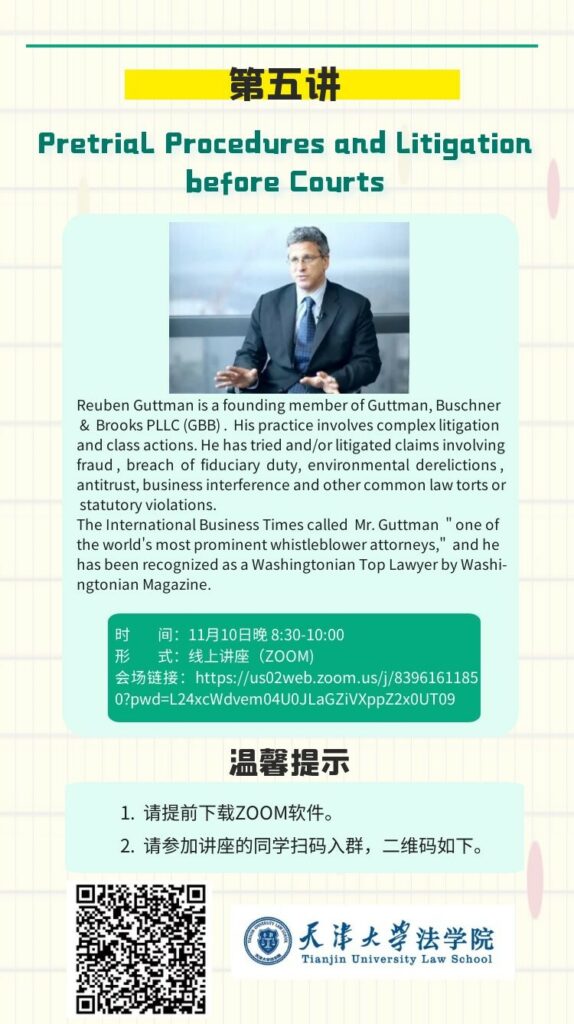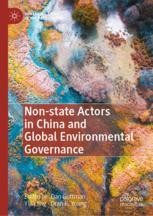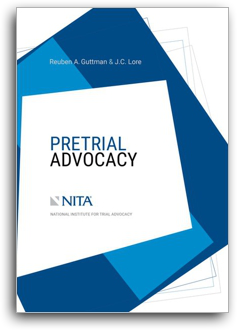GBB Partner Reuben Guttman will be speaking to law students Tianjin University Law School in China. He regularly teaches Equal Protection at American University School of Public Affairs.

By Staff
GBB Partner Reuben Guttman will be speaking to law students Tianjin University Law School in China. He regularly teaches Equal Protection at American University School of Public Affairs.

By Staff
Workplace whistleblowers and a fear of losing federal funds are expected to play vital roles in ensuring compliance with COVID-19 vaccine mandates ordered by President Joe Biden’s administration for U.S. businesses, nursing homes and hospitals, according to experts.
Biden announced last Thursday that his administration will enforce the vaccine mandates starting on Jan. 4. The rules apply to employers with at least 100 workers, federal contractors and employees of nursing homes and other healthcare facilities that receive reimbursements under the Medicare and Medicaid government healthcare programs.
On Saturday, a federal appeals court suspended the new vaccine and testing requirement for private companies while the court considers it in more depth. It gave the Justice Department until late Monday to respond. The portion of the mandate for the healthcare sector is not affected by Saturday’s ruling.
If the rule goes into effect, the U.S. Occupational Safety and Health Administration (OSHA), which enforces work safety rules, is not likely to immediately swoop in to ensure that vaccination and testing rules are being followed, experts said.
The Centers for Medicare & Medicaid Services (CMS), the regulator for the two federal health programs, does not typically survey accredited healthcare providers unless there is a complaint or a need for recertification, according to Sandy DiVarco, a partner at the firm McDermott Will & Emery who represents healthcare providers.
Since patients and clients do not have access to staff vaccination records, those complaints would likely come from another staff member, DiVarco added.
“On a stakeholder call, CMS reiterated their desire to work with providers to come into compliance and not to sort of send SWAT teams to go out and look for problems,” DiVarco said.
Healthcare facilities could lose their access to Medicare and Medicaid funds if they fail to heed the vaccine requirements. Medicare serves people aged 65 and older and the disabled while Medicaid serves the poor.
“For most hospitals across the country not being able to participate in Medicare would be crippling,” said Akin Demehin, the American Hospital Association’s director of policy.
The healthcare workers mandate applies to more than 10 million employees, around 70% of whom already have been vaccinated. It covers around 76,000 healthcare providers that receive Medicare or Medicaid reimbursements including hospitals, nursing homes, dialysis centers, ambulatory surgical settings and home-health agencies.
For the private employer rules, OSHA has an estimated 800 safety and compliance inspectors to cover more than 100,000 companies covered by the mandate. The agency likely will rely on whistleblowers concerned about unvaccinated co-workers or that unvaccinated people are not being tested as required, said James Hermon, a labor and employment expert with the firm Dykema Gossett.
Hermon predicted that OSHA will hit a couple of big employers with major fines soon after the mandate takes effect.
“That will be done intentionally to put some virtual heads on spikes,” Hermon said. Each violation can bring a fine of nearly $14,000.
The financial threat from a federal law called the False Claims Act, which rewards whistleblowers for reports of fraud that results in losses for the government, might ensure compliance with the vaccine rules better than OSHA’s penalties, according to one expert.
“We’re interested in these cases and we’ve been looking at them,” said Reuben Guttman, a whistleblower lawyer with the firm Guttman, Buschner & Brooks, who said he has been talking to unions. “The idea of using the False Claims Act to enforce health and safety standards is not novel.”
(Reporting by Diane Bartz, Ahmed Aboulenein and Tom Hals; Editing by Will Dunham)
By Staff
District of Columbia Fellow Reuben A. Guttman has co-authored a new book, “Pretrial Advocacy,” to be released by the National Institute for Trial Advocacy (Now available here). The volume, which was also written by Rutgers Professor J.C. Lore, discusses the “unwritten rules” of pre-trial preparation and grapples with the challenges of efficiently developing cases that can stand up to jury scrutiny in the face of overflowing demand, even though 90% of civil cases never make it to trial.
If anybody is qualified to talk about effective legal advocacy, its Reuben Guttman. The Guttman, Buschner & Brooks founding partner has spent his 36-year career releasing staggering sums of money from the grasps of oil refineries, pharmaceutical organizations, and prisons who have run afoul of laws such as the False Claims Act and the Federal Fair Labor Standards Act. Mr. Guttman, who started his legal career as counsel for the Service Employees International Union, AFL-CIO, is a whistleblower’s best friend—in 2015, he helped Florida’s Lynn Szymoniak gain an $18 million settlement after she uncovered a fraudulent foreclosure scheme that threatened to undermine her own housing and that of thousands of other homeowners.
In addition to being a legal superstar, Mr. Guttman is a familiar figure in the academy and the press. When he isn’t giving his time to Emory University School of Law as an adjunct professor, journal advisor, or board member, he’s writing for or being quoted in more than 30 journals and media outlets as varied as The New York Times and Peking University Public Interest Law Journal. Mr. Guttman’s international influence stretches from the U.S. federal government, where he has testified before Congress and advised President Clinton’s transition team, to as far away as China, where he has offered his thoughts on Chinese labor laws at the Dutch Embassy and lectured at universities in Shanghai and Beijing.
By Staff
 This book is the first effort to develop a broad and deep perspective on the emerging space occupied by “non-state actors” in China in the context of global environmental governance. It will serve as a primer both for scholars seeking to understand China’s environmental governance system and for practitioners working with policymakers and administrators within that system. Individual chapters explore what works in achieving social change, domestically as well as globally, and will provide guidance to activists and directors of NGOs as well as scholars.
This book is the first effort to develop a broad and deep perspective on the emerging space occupied by “non-state actors” in China in the context of global environmental governance. It will serve as a primer both for scholars seeking to understand China’s environmental governance system and for practitioners working with policymakers and administrators within that system. Individual chapters explore what works in achieving social change, domestically as well as globally, and will provide guidance to activists and directors of NGOs as well as scholars.
Authors: Dan Guttman, Yijia Jing and Oran Young.
Dan Guttman, an attorney with GBBLegal, is a lawyer and former public servant who has devoted his career to issues of public policy. Since arriving in China as a Fulbright scholar in 2004, he has taught and developed comparative China/western governance courses and programs at Shanghai Jiao Tong, Peking, Tianjin, Tsinghua, and Fudan Universities and taught at Duke Kunshan University and New York University Shanghai.
Yijia Jing is a Chang Jiang Scholar, Dean of the Institute for Global Public Policy, and Professor of the School of International Relations and Public Affairs, Fudan University.
Oran Young is professor emeritus and co-director of the Program on Governance for Sustainable Development at the Bren School of Environmental Science & Management at the University of California Santa Barbara.
By Staff
A new book on pretrial advocacy, published this week by the National Institute for Trial Advocacy (NITA) and Wolters Kluwer, takes on a world of litigation that has been radically transformed in recent years by remote proceedings and other practice norms that often deliver resolution long before litigants face off in the courtroom (available in print and e-book here).
In Pretrial Advocacy, authors Reuben A. Guttman and J.C. Lore address the challenges of litigating in a civil justice system that is overburdened yet essential to implementation of the rule of law. Even as nearly 90% of all civil matters never come before a jury, lawyers must nevertheless prepare cases as though they will. Because modern civil litigation is, the authors say, “front loaded,” lawyers are challenged early on in the pretrial process to consider the rules of evidence and civil procedure as they gather information to plead a plausible complaint.
“The pretrial process is laden with unwritten norms. All parties, from litigants to jurists, struggle to provide efficient resolutions while balancing due process,” said Lore, a Distinguished Clinical professor and Director of Trial Advocacy at Rutgers Law School. “We wanted to write something that explains it all.” The strategies and techniques outlined in Pretrial Advocacy put forward responsive new approaches to teaching advocacy in both law school and continuing legal education settings.
In addition to practical tips and insights from some of the nation’s foremost jurists and practitioners, Pretrial Advocacy features a foreword by retired U.S. District Court Judge for the District of Massachusetts and Harvard Law faculty member Nancy Gertner. “Pretrial Advocacy fills an important space for litigators,” Gertner said. “It teaches how to try cases from the moment a client contacts the lawyer through the trial, encouraging lawyers to engage in strategic decisions about pretrial discovery and motion practice. Why depose this witness rather than another? What is the purpose? What are the salient documents—not every single one, not just the few ‘gotcha’ documents, but those that build the narrative.”
Pretrial Advocacy closes with chapter dedicated to public interest litigation. “We thought a chapter on public interest litigation was necessary because there are too many people—from immigrants to victims of race and gender discrimination and whistleblowers—seeking to have their voice heard, and they need competent representation,” said Guttman. Guttman is a founding partner of the Washington, D.C. law firm of Guttman, Buschner & Brooks, PLLC, where he has represented clients in False Claims cases in matters returning more than $6 billion to the United States government.
Guttman and Lore are available to the media to comment on matters in civil litigation and the civil justice system.
 Pretrial Advocacy is the ideal textbook for law school clinics, law school pretrial litigation courses, and practicing lawyers. Both practical and theoretical, it teaches litigation as a process informed by rules and cases, but also by strategic considerations. Its hands-on and accessible text makes it a perfect reference for learning skills and a continuing reference. (Available in print and e-book here.)
Pretrial Advocacy is the ideal textbook for law school clinics, law school pretrial litigation courses, and practicing lawyers. Both practical and theoretical, it teaches litigation as a process informed by rules and cases, but also by strategic considerations. Its hands-on and accessible text makes it a perfect reference for learning skills and a continuing reference. (Available in print and e-book here.)
Washington DC Office
Embassy Row District
1509 22nd Street, NW
Washington, D.C. 20037
Phone: 202-800-3001
